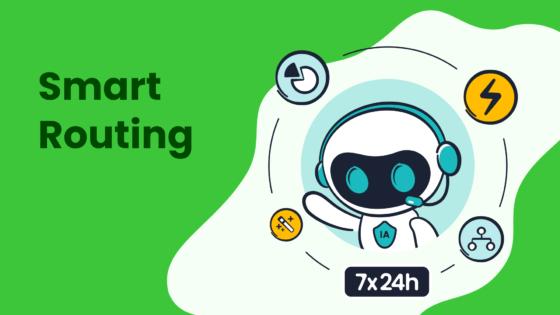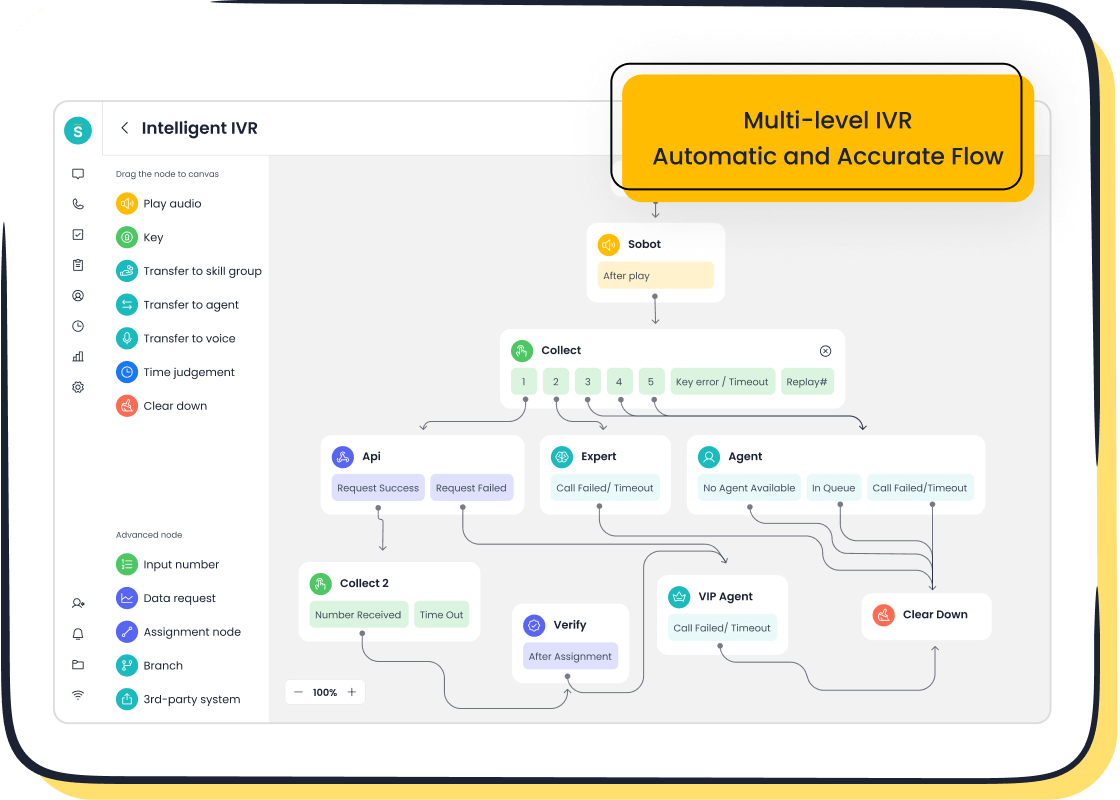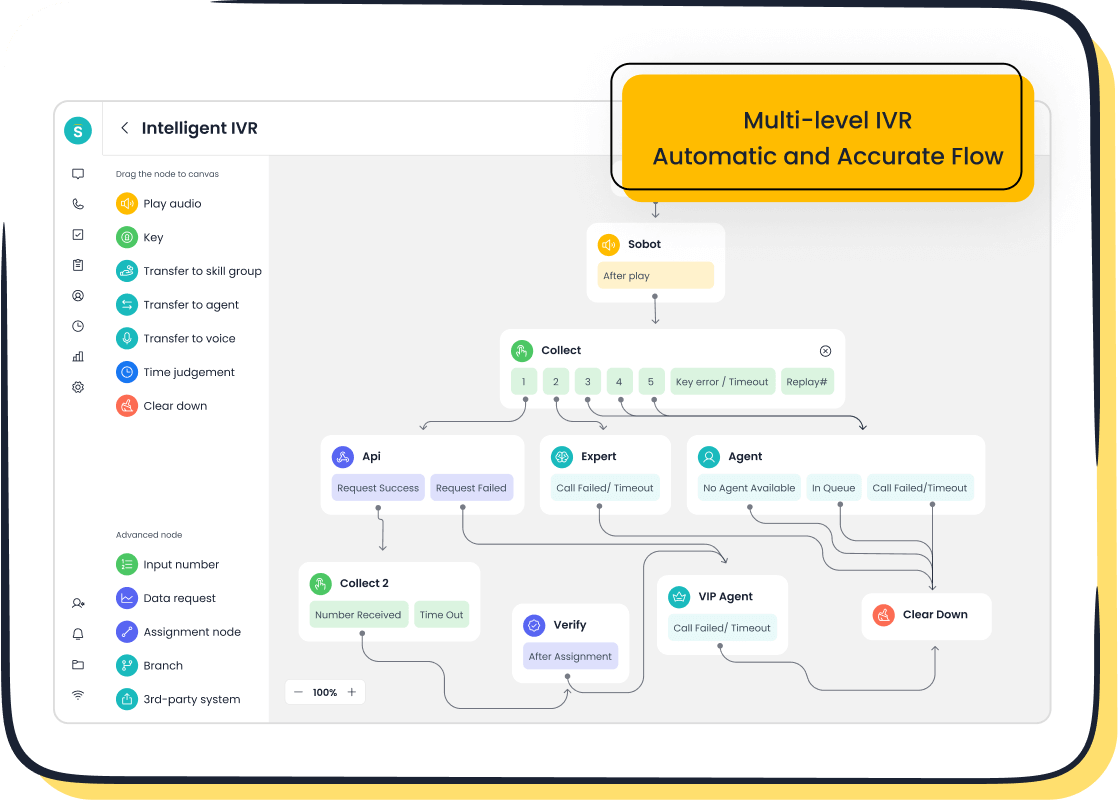Key Innovations in Ecommerce Call Center Outsourcing

Ecommerce call center outsourcing continues to transform rapidly in 2025. Companies now embrace AI, automation, omnichannel support, and advanced cloud solutions to stay ahead. Market data shows the global outsourcing sector could reach nearly $905 billion by 2027, and cross-border ecommerce is expanding fast. Businesses use these trends to create a customer-centric approach, boost operational efficiency, and deliver superior customer experience. Sobot and Sobot AI lead this change by offering innovative, scalable solutions that help brands meet rising expectations in a competitive landscape.
2025 Trends in Ecommerce Call Center Outsourcing
Market Growth
The ecommerce call center outsourcing market has seen remarkable growth over the past five years. In 2021, the market reached about $82.2 billion. By 2024, it climbed to $93.53 billion. The retail and ecommerce sector made up nearly 15% of this market in 2023. This expansion comes from the rising need for customer support as online shopping grows. Experts predict the market will reach $145.22 billion by 2033, with a steady annual growth rate. These trends show that ecommerce call center outsourcing will remain a key part of business strategy in 2025. Companies like Sobot help brands scale their operations and meet customer expectations with advanced solutions. Source
Performance-Based Models
In 2025, many businesses will shift to performance-based contracts in ecommerce call center outsourcing. Brands now want measurable results, such as higher customer satisfaction and faster response times. This approach rewards partners who deliver strong outcomes. Sobot supports this trend by offering data-driven insights and real-time analytics. These tools help companies track agent performance and improve service quality. Performance-based models encourage continuous improvement and align with the latest customer service outsourcing trends.
Remote Work Integration
Remote work has become a standard in ecommerce call center outsourcing. In 2025, more companies will use remote teams to access global talent and provide 24/7 support. This shift allows businesses to respond quickly to changing customer needs. Sobot’s cloud-based contact center platform makes remote work easy. Agents can manage calls, chats, and tickets from anywhere, ensuring seamless service. Remote work integration stands out among the top contact center trends and supports the demand for flexible, scalable solutions.
Note: The 2025 trends in ecommerce call center outsourcing highlight the need for innovation, flexibility, and measurable results. Companies that adapt to these trends will stay ahead in a fast-changing market.
AI and Automation for Customer Experience

Sobot AI Solutions

Sobot leads the way in ai and automation for ecommerce call centers in 2025. The company’s AI-driven solutions transform customer experience by streamlining support across voice, chat, and social media. Sobot’s Voice/Call Center platform uses intelligent IVR and AI-powered Voicebot to route calls, recognize intent, and provide instant answers. This ai-powered transformation reduces wait times and increases customer satisfaction. Sobot’s unified workspace allows agents to manage all interactions efficiently, ensuring every customer receives fast, accurate support. Businesses using Sobot report higher satisfaction scores and improved operational efficiency.
Hybrid Human-AI Teams
Hybrid human-AI teams have become the standard in 2025. Sobot’s approach combines ai-driven automation with skilled agents to deliver a seamless customer experience. This model offers several measurable benefits:
- Productivity rises as AI handles routine workflows, freeing agents for complex tasks.
- Scalability improves because AI agents can manage demand spikes instantly.
- Customer satisfaction increases when AI resolves simple inquiries quickly.
- Employee engagement grows as agents focus on meaningful work, reducing burnout.
- Innovation thrives by blending AI’s analytics with human creativity.
Sobot’s hybrid teams ensure that customers always receive the right balance of personalized automation and human empathy.
Self-Service & Chatbots
Self-service and chatbots are now mainstream in ecommerce. By 2025, about 34% more companies will use AI chatbots. Already, 60% of B2B and 42% of B2C brands rely on chatbot software. Enterprises lead with a 24% adoption rate, while small businesses follow at 16%. In the United States, 36% of companies use chatbots, driving cost savings and better customer service. Ecommerce brands deploying chatbots see a 20% increase in average order value within the first week. Sobot’s AI chatbots offer 24/7 support, enabling customers to resolve issues anytime. This ai-driven automation boosts satisfaction and supports business growth. Source
Omnichannel Support with Sobot

Unified Customer Interactions
Sobot delivers a true omnichannel experience by unifying all customer interactions across voice, chat, email, and social media. Agents access a single workspace that brings together every conversation, making it easy to track customer journeys and respond quickly. This unified approach ensures that digital customer service remains consistent, no matter which channel customers choose. Sobot’s platform allows agents to see previous interactions, reducing repetition and frustration for customers. Brands using Sobot report faster resolution times and higher satisfaction because agents always have the full context of each customer’s history.
Sobot’s unified workspace helps agents manage multiple interactions at once, improving efficiency and accuracy in digital customer service.
Multilingual & Multicultural Service
Global ecommerce brands need to connect with customers in many languages and cultures. Sobot supports multilingual and multicultural service, enabling brands to communicate in customers’ native languages. This approach builds trust and emotional connection, making customers feel valued. AI-driven personalization adapts content for each region, creating authentic messaging that resonates with diverse audiences. Brands see stronger engagement and loyalty when customers feel understood. Sobot’s multilingual templates and time zone support help agents deliver relevant digital customer service, no matter where customers live.
Weee!, America’s largest online Asian supermarket, improved its customer interactions by using Sobot’s flexible IVR and multilingual features. The company saw a 20% increase in agent efficiency and a 50% reduction in resolution time, with customer satisfaction reaching 96%. Read more
Seamless Channel Integration
Seamless channel integration is essential for modern ecommerce call centers. Sobot addresses technical challenges by offering unified customer data management and real-time synchronization between platforms. This integration gives agents a complete view of all customer interactions, improving accuracy and reducing resolution time. Key requirements include:
- Unified customer data management for a single source of truth
- Real-time data sync with backend systems like CRM and ERP
- Robust payment integration with PCI-DSS compliance and encryption
- Continuous employee training to keep up with technology changes
- Automated inventory updates for accurate stock and pricing
Omnichannel strategies like Sobot’s can boost customer retention up to 89% by ensuring every interaction is smooth and personalized. Agents benefit from contextualized digital customer service, leading to higher satisfaction and loyalty.
Cloud Solutions in Ecommerce Call Center Outsourcing
Scalability & Flexibility
Cloud-based technology has changed how ecommerce brands manage customer support. Sobot’s cloud-based Voice/Call Center platform lets businesses scale operations up or down with ease. Brands can add agents or expand service hours quickly during busy seasons. This prevents long wait times and keeps customers happy. The platform also supports remote work. Agents only need an internet connection to help customers from anywhere. This flexibility allows companies to hire talent from different locations and reduce costs.
Key benefits include:
- Fast scaling of agent teams to match demand
- Easy expansion of service hours without extra infrastructure
- Remote work options for agents worldwide
- Lower overhead and commuting costs
These features give ecommerce brands the agility they need to grow and adapt in a fast-changing market.
Global Reach
Sobot’s cloud contact centers support global ecommerce operations. The platform offers access to phone numbers in over 50 countries and maintains a network with 110 points of presence in 93 cities. This global reach ensures that brands can serve customers across time zones and regions. Sobot’s system uptime reaches 99.99%, so businesses can rely on stable service day and night. With cloud-based technology, brands can enter new markets without building physical call centers. This approach helps companies deliver consistent support to customers everywhere.
Sobot’s global network allows ecommerce brands to connect with customers no matter where they are.
Integration & Security
Security and integration matter most for ecommerce brands. Sobot’s cloud-based technology uses advanced encryption to protect sensitive customer data. The platform includes customizable access controls and user permissions for strict data governance. Sobot also supports seamless integration with CRM and other business systems, making it easy to manage customer information in one place. The company follows industry standards for data privacy and security, giving brands peace of mind.
- Data encryption and mobile security
- Risk control and security verification
- Compliance with industry standards
Sobot’s secure and integrated cloud solutions help ecommerce brands build trust and protect customer information.
Data Security and Compliance
Data security stands as a top priority in ecommerce call center outsourcing. Brands must protect sensitive customer information from a wide range of threats. In 2025, common risks include credit card fraud, phishing, refund fraud, DDoS attacks, brute force attempts, e-skimming, and insider threats. These dangers can disrupt operations and damage trust. Ecommerce call center outsourcing providers must address these risks with robust security measures.
Privacy Standards
Strong privacy standards form the backbone of secure ecommerce call center outsourcing. Sobot uses encrypted storage and granular access controls to protect sensitive call data. The platform supports retention schedules and audit logs, which help brands comply with regulations like GDPR and HIPAA. Agents can pause or resume call recordings to safeguard privacy during sensitive moments. Sobot’s clear privacy policies and legal disclaimers further support regulatory adherence. These features help reduce the risk of data breaches and maintain customer trust.
Sobot’s commitment to privacy ensures that ecommerce call center outsourcing meets the highest standards for data protection.
Secure AI Implementation
Secure AI implementation is essential for modern ecommerce call center outsourcing. Sobot follows best practices by using end-to-end encryption for all data transmissions. Role-based access controls restrict who can view or edit sensitive information. The platform maintains audit logs and continuous monitoring to detect security events quickly. Sobot also uses federated learning, which keeps raw data localized and never leaves the source. Regular privacy checks and staff training further strengthen data protection. These steps ensure that AI-driven solutions remain safe and compliant.
Regulatory Compliance
Regulatory compliance presents unique challenges for ecommerce call center outsourcing providers. Companies must follow local and international laws, such as GDPR, to avoid penalties and reputational harm. Sobot addresses these challenges by providing secure APIs, multi-factor authentication, and regular vulnerability assessments. The platform adapts to regional legal frameworks and cultural expectations, ensuring compliance across markets. Physical security measures, such as restricted access and secure server locations, add another layer of protection. Regular agent training on phishing awareness and breach response helps maintain high standards.
Ecommerce call center outsourcing with Sobot gives brands confidence that their customer data remains secure, private, and compliant with global regulations. For more on GDPR, visit gdpr.eu.
Personalization and Customer Experience Trends
AI-Driven Insights
AI-driven insights shape the future of digital customer service. Sobot uses advanced analytics to review every customer interaction, uncovering patterns in sentiment, behavior, and emotion. This approach helps brands make data-driven decisions that improve customer satisfaction and service quality. AI tools such as chatbots and conversation intelligence reduce response times and provide 24/7 support. For example, Sobot’s AI-powered chatbots handle order inquiries and offer personalized product recommendations, making each interaction more relevant. AI-generated call summaries help agents deliver faster, more accurate service. Multilingual AI assistants also expand service coverage, ensuring accessibility for global customers. These trends drive a customer-centric focus and set new standards for customer experience outcomes.
Companies that use AI-driven insights see higher satisfaction and better retention rates, as they can adapt quickly to customer needs.
Hyper-Personalization
Hyper-personalization stands out as a key trend in ecommerce call centers. Sobot’s AI analyzes customer data to tailor every interaction, from product suggestions to support responses. This level of personalization makes customers feel valued and understood. Brands that use hyper-personalized communications see up to 30% higher conversion rates and three times greater returns compared to mass promotions. Shopify, for instance, leverages personalized recommendations to boost loyalty and retention. Sobot’s platform adapts to changing preferences, ensuring that digital customer service remains relevant throughout the customer journey. Personalized customer interactions foster trust and encourage repeat purchases, supporting long-term customer retention.
- Personalized offers increase engagement and satisfaction.
- Tailored experiences build trust and loyalty.
- Adaptive personalization maintains relevance over time.
Customer Loyalty
Customer loyalty depends on consistent, high-quality interactions. Sobot helps brands measure loyalty using key metrics such as Customer Satisfaction Score (CSAT), First Call Resolution (FCR), and Net Promoter Score (NPS). High CSAT and FCR scores indicate efficient service and strong satisfaction. Sobot’s analytics tools track these metrics, allowing brands to identify challenges and improve customer experience strategies. Monitoring loyalty metrics guides targeted improvements, which boost retention and drive repeat business. A customer-centric approach ensures that every interaction supports satisfaction and loyalty, making digital customer service a powerful tool for long-term success.
Tracking loyalty metrics helps brands maintain a customer-centric focus and achieve sustainable growth.
Empowering Agents and Employee Experience
Training & Upskilling
Ecommerce call centers in 2025 focus on continuous learning. Companies now use employee-driven, role-specific training programs. For example, AlphaSights involved over 27% of employees as course creators, which led to a 95% course completion rate and higher productivity. Amazon’s Upskilling 2025 initiative combines classroom instruction with on-the-job experience, offering apprenticeships and self-paced learning. These programs help agents gain practical skills and advance their careers. Generative AI supports personalized learning by mapping competencies and creating interactive simulations. Microlearning, with short lessons and quizzes, fits busy schedules. Blended learning, which mixes online modules and instructor-led sessions, offers flexibility. Sobot’s platform enables agents to access training resources and AI-powered learning paths, ensuring they stay up to date with the latest customer service trends.
Tip: Involving agents in course creation increases engagement and ownership of learning.
Agent Tools & Workspaces
Unified agent workspaces have become essential for productivity and satisfaction. Sobot’s unified workspace brings together customer history, tickets, and all communication channels in one place. Agents no longer need to switch between apps, which reduces handling time and errors. AI-powered chatbots handle up to 70% of routine inquiries, freeing agents to solve complex problems. Intelligent escalation ensures that unresolved issues reach human agents with full context, speeding up resolution. Automated workflows, such as ticket routing and proactive notifications, streamline daily tasks. Integration with CRM and knowledge bases allows agents to deliver personalized support. Sobot’s tools also support agent well-being by enabling flexible schedules and manageable workloads.
- Unified workspaces boost efficiency and teamwork.
- AI and automation let agents focus on meaningful tasks.
Performance Monitoring
Performance monitoring now uses advanced tools and real-time analytics. Dedicated quality assurance managers oversee agent performance. Scorecards track key metrics tailored to each brand. Real-time monitoring tools, such as call recording and speech analytics, help supervisors provide instant feedback. AI-powered analytics identify trends and suggest improvements. Sobot’s ai-driven workforce management platform offers dashboards that track productivity and customer satisfaction across all channels. Regular coaching sessions and interactive feedback help agents improve their skills. Multichannel monitoring ensures quality service on phone, email, chat, and social media.
Regular feedback and data-driven insights help agents grow and deliver better customer experiences.
Ecommerce call center outsourcing in 2025 brings major advancements that help brands stay competitive. Key innovations include:
- Scalability and 24/7 global support for diverse customer needs
- Multilingual service and industry expertise for tailored experiences
- Advanced AI and automation for efficiency and proactive sales strategies
- Omnichannel integration to unify customer journeys
- Data-driven insights and quality assurance for continuous improvement
(Source: Statista)
To succeed, ecommerce brands should:
1. Audit and unify first-party data for a complete customer view 2. Invest in AI-powered tools like Sobot for real-time, scalable support 3. Prioritize privacy and regulatory compliance 4. Embrace omnichannel strategies across all touchpoints 5. Continuously optimize with analytics and customer feedback
Sobot’s all-in-one platform empowers brands to deliver seamless, personalized service. Companies that adopt these innovations will lead in customer experience and business resilience as ecommerce call center outsourcing evolves.
FAQ
What is ecommerce call center outsourcing?
Ecommerce call center outsourcing means hiring a third-party company to handle customer service for online stores. Brands like Sobot help businesses manage calls, chats, and emails. This approach saves costs and improves customer satisfaction. Learn more.
How does Sobot improve ecommerce call center outsourcing?
Sobot uses AI, automation, and cloud solutions to boost efficiency in ecommerce call center outsourcing. The platform supports voice, chat, and social media. Brands see faster response times and higher satisfaction scores.
Sobot’s system handles over 6 million online communications daily.
Is data security important in ecommerce call center outsourcing?
Yes, data security is critical. Sobot uses encrypted data transfer and follows GDPR standards. The platform protects customer information and ensures compliance with privacy laws. Secure ecommerce call center outsourcing builds trust and reduces risks.
Can ecommerce call center outsourcing support global customers?
Ecommerce call center outsourcing with Sobot offers global reach. The platform provides phone numbers in over 50 countries and supports multilingual service. Brands can serve customers worldwide, no matter the time zone.
What are the main benefits of ecommerce call center outsourcing?
- 24/7 customer support
- Cost savings
- Access to advanced technology
- Scalable operations
Sobot’s ecommerce call center outsourcing solutions help brands grow, improve customer experience, and stay competitive.
See Also
Comprehensive Overview Of Omnichannel Call Center Platforms
Key Functionalities To Look For In CRM Call Software
Step-By-Step Process For Deploying Omnichannel Contact Centers
